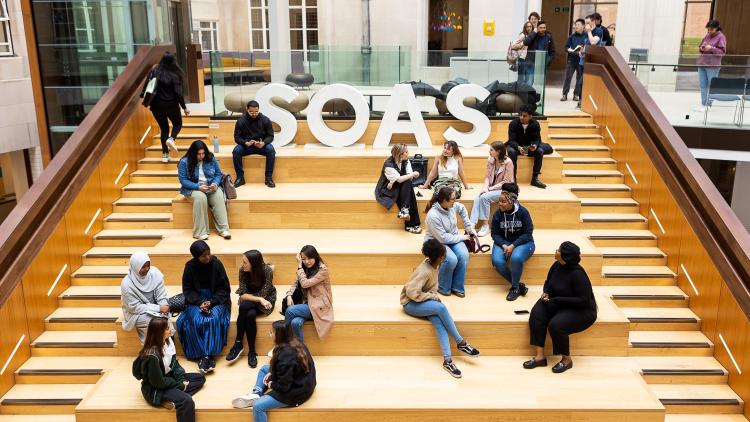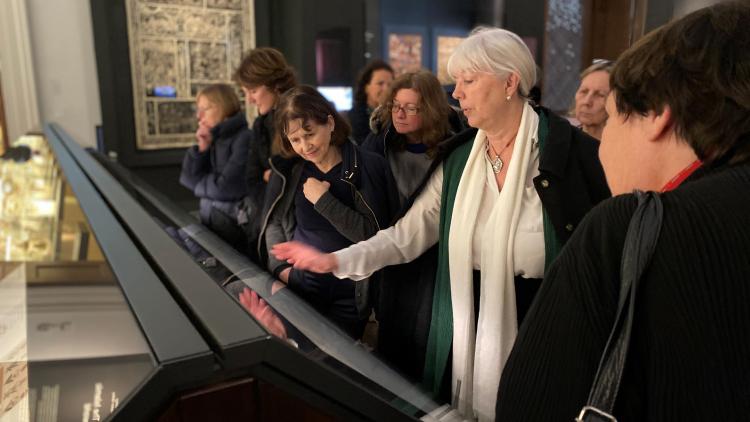SOAS-led climate change network organises teacher training for universities across Africa, Asia, and the Caribbean


The University Network for Strengthening Macro-financial Resilience to Climate and Environmental Change and the Resilience Adaptation Mainstreaming Program (RAMP) organised a 4-day teacher training workshop on Climate Change Adaptation in Accra in February 2024.
The workshop, co-hosted by RAMP, the University Network, the University of Ghana, and the Ghana Institute of Management and Public Administration, had more than 100 faculty from 13 RAMP member universities across Africa, Asia, and the Caribbean. The training strengthened their capacity to deliver professional courses to ministries of finance in their respective countries on topics that emphasise the impacts of climate change on macroeconomic development, fiscal policy, trade, and debt sustainability.
The workshop taught five specialized topics in parallel tracks, each emphasising the macro, fiscal, and financial impacts of climate change. The courses were designed to prepare faculty to co-teach practitioner courses together with RAMP trainers to the ministry of finance officials in their respective countries.
This is a fundamental part of the RAMP approach. By improving university teaching and research capacity related to climate adaptation economics and finance, RAMP is helping to build long-term capacity in ministries of finance responsible for planning and implementing suitable macro-level adaptation actions. By mainstreaming climate adaptation into the core capacities and operations of ministries of finance, governments will be better positioned to align and effectively pursue their adaptation and development priorities, as well as access adaptation finance.
Professor Ulrich Volz, Director of the SOAS Centre for Sustainable Finance and Academic Director of the University Network for Strengthening Macro-financial Resilience to Climate and Environmental Change expressed his delight at the great motivation with which faculty from member universities participated in the programme:
"It is very evident that colleagues are keen to help their countries to adapt and become more resilient to the impacts of climate change. They do recognise that a better understanding of climate risks and of ways of mitigating these is critical, and they want to contribute to building this knowledge in their societies and among government officials."
They do recognise that a better understanding of climate risks and of ways of mitigating these is critical, and they want to contribute to building this knowledge in their societies and among government officials.
Dr Harald Heubaum, Deputy Director of the SOAS Centre for Sustainable Finance and Academic Deputy Director of the University Network pointed to RAMP’s next steps in training ministry of finance officials:
"This workshop has played an important role in sharpening our offering and helping to prepare our academic partners for the co-delivery of practitioner courses, the first of which will run later in the year. There is much work still to do but we are well on our way."
Dr Wisdom Akpalu, Dean of the School of Research and Graduate Studies at the Ghana Institute for Management and Public Administration, emphasised the timeliness and importance of the workshop, stating: "We can no longer pretend that business as usual will serve us."
About the University Network and RAMP
The University Network for Strengthening Macrofinancial Resilience to Climate and Environmental Change was established to promote multi-disciplinary academic teaching and research in areas important for strengthening macrofinancial resilience to climate change.
The Network consists of global universities that seek to build capacities to conduct relevant high-quality teaching and research and acts as a strategic and knowledge partner of major international organisations working in this field. The Network is managed by a Secretariat hosted by the Centre for Sustainable Finance at SOAS, University of London.
The University Network is a key part of the Resilience Adaptation Mainstreaming Program (RAMP). The objective of RAMP is to accelerate climate adaptation in developing countries by building capacity in ministries of finance, planning and economics to understand, plan for, and finance climate adaptation actions.
RAMP is supported by a secretariat hosted by the World Resources Institute, working in close partnership with the Coalition of Finance Ministers for Climate Action, the Bretton Woods institutions, UNDP, regional development banks, and other stakeholders.



